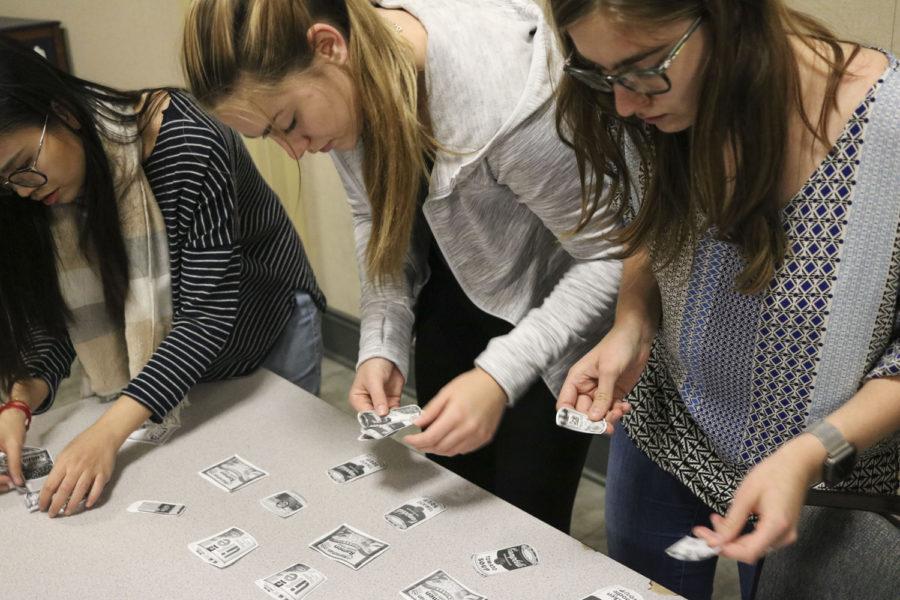A young man sat at a table behind two black curtains in the William Pitt Union Assembly Room Monday night. Across the table, two individuals intensely interrogated him.
“What religion do you practice?” asked one.
“What does your name mean?” followed the other.
This scenario was part of Boxes and Walls, an event held Monday from noon-9 p.m. About 200 people attended the event — organized by Assistant Director of Resident Life Phil Badaszewski and Pitt Aquatic Programs Coordinator Alycia Miller, working with Pitt’s Office of Diversity and Inclusion.
Monday’s simulation was Student Affairs’ third Boxes and Walls event since the first in 2015. The idea came from a previous resident life director, who had been part of a similar project at another school.
Attendees walked through seven stations, each created and staffed by one of the participating student organizations — Campus Women’s Organization, Pitt Global Affairs, Students for Disability Advocacy, the Asian Studies Center, Muslim Students’ Association and PittServes. During the 35- to 40-minute tour of all seven stations, at each station participants were asked to complete tasks that simulated challenges and prejudices a marginalized group faced. Afterwards, students were invited to to talk about their experiences and share their thoughts on the simulations.
The Muslim Students’ Association simulated what it is like to be racially profiled and questioned by the the Transportation Security Administration at an airport. Saman Hasan, a sophomore biology and history major and member of MSA, served as one of the interrogators for the simulation.
“[We’re] showing how Muslims can get profiled based on simple things like their name, or what they’re wearing,” Hasan said.
MSA members overseeing the simulation told students afterwards how these interviews can take so long that someone may often miss their flight.
Organizers added this simulation this year after receiving student feedback. Badaszewski, who has been a part of Boxes and Walls since its start, said that feedback is a necessary to improve the event.
“MSA, global affairs and Asian studies are all new to this event this year, and some of that comes from the feedback from students that asked for rooms concerning Islamophobia or on international students.”
The first simulation of the tour was created and run by the Pitt Pantry, the University’s volunteer-run nonprofit food pantry for Pitt students, faculty and staff. Participants were ascribed different amounts of money and then asked to plan how to pay for food for a week with what they were given. Badaszewski said the Pitt Pantry, which primarily serves students suffering from food insecurity, is a service many students may not know is necessary on a college campus.
“But by having to go in … and trying to meal plan for a week on a particular budget, it makes you rethink the need for that service on our campus,” he said.
Miller, who helped organize the event, has been involved since 2015. She said the event has the ability to challenge people who have not considered what affects the lives of marginalized people or those who do not believe certain disadvantages exist.
“With this event, we’re exposing students to things they haven’t thought of before in their daily lives or that we are changing some ideas people have about diversity,” she said.
Ngozi Obidike, a junior psychology major, took on the role of a child with ADHD during PittServes’s impaired education simulation. She said she had never realized the significant impact disabilities could have on a person’s educational experience.
“For me, in my background, those kind of disabilities were never considered disabilities, and just to embody it and realize that this is very detrimental to my learning experience really opened my eyes,” she said.
Both Badaszewski and Miller hope the event can continue into the next several years, focusing on different social issues each year.
“Last year mostly focused on obstacles related to race and gender,” Miller said “This year it’s economics, it’s religion and other unseen parts of everyday life.”
Miller hopes when students leave the event they’ve gained knowledge that will help them to be kinder and friendlier people.
“At the end of the day I hope everybody takes a step back, too, and take what they learned here, what they heard in those rooms and apply it to life,” she said.



